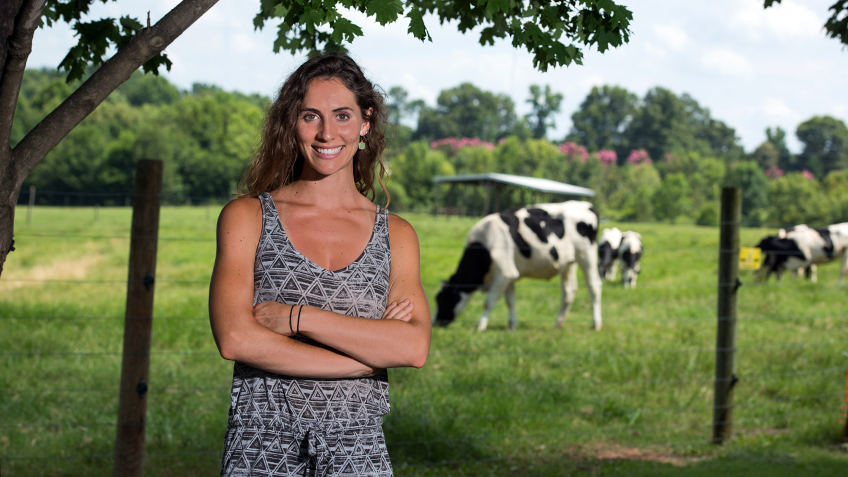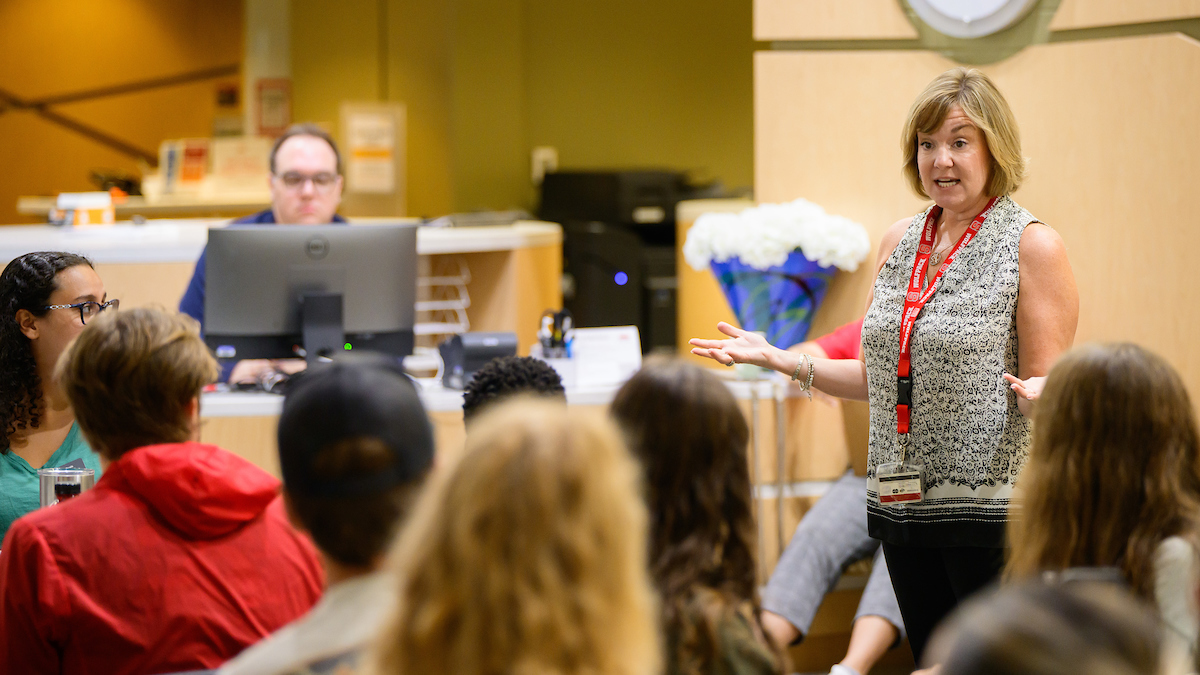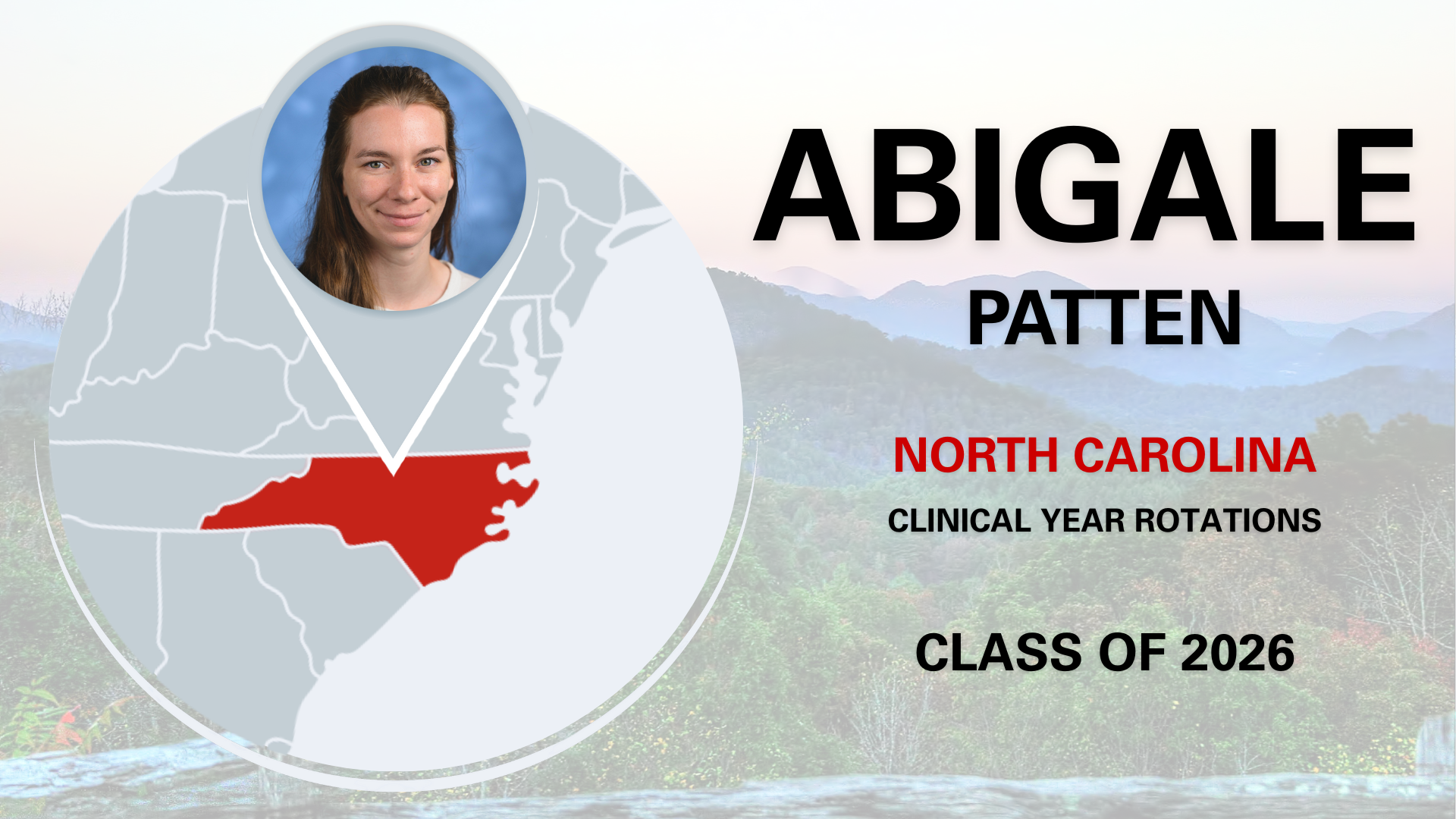Class of 2020: Following Her Heart

Hannah Leigh Varnell has always thought like a veterinarian.
A childhood in rural Gloucester County, Va., was spent not just loving animals, but intimately caring for them. There was the time when she was 11 and a pregnant hound dog wandered into her backyard. Varnell ended up with 14 puppies. She loved just having the dogs, but equally enjoyed making sure they got all their vaccinations on time. She got up early in the morning to feed them a nutritional mush.
“That side always fascinated me more than just playing with puppies,” says Varnell. “It was more like, ‘OK, how can you make sure their lives are completely healthy and happy?’”
Then there was the time when, at about 12, one of her horses cut herself on a gate, her shoulder slit wide open exposing bone and tendons. Muscle was dangling.
So Varnell held the horse’s wound together to minimize the bleeding, keeping her calm as she waited on an emergency veterinarian.
[cvm_video id=”tYDg4vBDW7c”][/cvm_video]
It felt natural — always has. Perhaps not a surprise for someone who knew she wanted to be a vet when she was 2 years old and at 5 years old would spell “veterinarian” perfectly on a drawing, but on the same drawing misspell the word “also.”
And now, after forays into studying economics and international development and environmental sustainability, with a love of veterinary medicine never far from her heart, Varnell will enter North Carolina State University’s College of Veterinary Medicine (CVM) as a part of the class of 2020.
And it will feel like home.
“I’m so ready to get started,” she says with unwavering conviction.
Varnell gets some of her veterinary traits from her her parents. Her dad, who works for the Virginia Institute of Marine Science, is the pragmatic one. Her mom, a nurse, is a nurturer — loving and affectionate. Those traits guided her early interactions with animals, which she says always felt instinctive and natural.
But burning intellectual curiosity also guides Varnell’s life. She could have stayed in Gloucester County, caring for hound dogs and horses and various farm animals in a small-town veterinary practice. But her giant-sized aspirations led Varnell to an undergraduate career at Stanford University. She majored in economics, compelled to do work that had a global impact. She ran track and field and cross country and tried guacamole and falafel for the first time.
Through all the new experiences, veterinary interest remained. During her time at Stanford, she made several trips to Africa as part of economic development and social entrepreneurship programs. She did work in water sanitation and hygiene in Kenya, Uganda and Tanzania. She worked with rural farmers and visited impoverished villages in South Africa. It was work that mattered to her, the type of work she went to Stanford to experience. But veterinary work found its way in.
[pullquote color=”orange”]“I realized veterinary medicine was more than working with domestic pets in a clinical setting. I realized that I could have a global impact in veterinary medicine…” [/pullquote]
“We took trips to the national parks and went to a wildlife rehabilitation center and I was just over the moon when I went there,” says Varnell. “I was just like, ‘This is where I would love to be working. And I kept trying to find outlets through international development to get to that place.”
Even within the villages where she worked, she found herself spending a lot of time caring for donkeys and other farm animals, as well as native wildlife. And she also handled puppies and kittens and re-homed them all before she left.
It was then when it came to her: She could have a global impact through veterinary medicine.
The official career turning point came after graduation, when Varnell moved to New York City to work for the One Acre Fund, an international trade and development nonprofit specializing in sustainable farming techniques. But the city was not a good fit.
“I spent most of my free time in parks, missing fresh air, the smell of horses and the sounds of nature,” says Varnell. “I loved the overall effect of my work, but I realized I could be more effective in an environment I loved, working with the ones I loved most: animals.
“I realized veterinary medicine was more than working with domestic pets in a clinical setting. I realized that I could have a global impact in veterinary medicine.”
So she jumped in, entering a post-baccalaureate program at Guilford College, with admission to NC State’s CVM always a goal. In addition to classes, she worked at the Oak Ridge Animal Hospital, volunteered at the Wildlife Rehabilitation Center at the North Carolina Zoo and the Carolina Equine Hospital, and worked with lizards and snakes at the Greensboro Science Center. Every week, she did at least two volunteering sessions, then classes, then scrubbed in at Oak Ridge.
And she loved it all, especially her time at the Oak Ridge Animal Hospital where she worked with Dr. Denise Sacks, a member of CVM’s first graduating class who wrote a letter of recommendation for Varnell. While learning the basics, from drawing blood to managing kennels, Varnell also worked closely with Dr. Sacks as she cared for Varnell’s dog, Clyde.
But it was the everyday experiences at Oak Ridge that reinforced Varnell’s dedication to veterinary medicine. There were a few cases where dogs were described as fearful and aggressive, but the dogs would still let her get close to them. “It seemed like there was this understanding, this mutual respect,” Varnell says. “But the feeling to me was just that this is something I live for — to be able to find an animal and give them that comfort and make them feel better at the same time.”
[pullquote color=”orange”]“NC State was one of the only schools that was going to give me that opportunity to explore my interests with some of the best technology, the best professors and the best resources…”[/pullquote]
Varnell doesn’t quite know what area of veterinary medicine she will end up focusing on at CVM. That’s part of what made the school so desirable, she says. She’s eager for surgical experiences. The crossover between human and animal medicine is extremely appealing.
She wants to be able to go abroad and to continue working with wildlife rehabilitation centers. She aims to bring more veterinary minds to climate change research.
But there’s one thing she knows for sure: This is where she belongs.
“NC State was one of the only schools that was going to give me that opportunity to explore my interests with some of the best technology, the best professors and the best resources,” says Varnell.
~Jordan Bartel/NC State Veterinary Medicine
- Categories:


